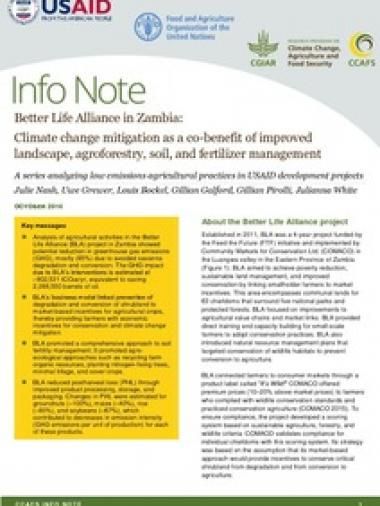Better Life Alliance in Zambia: Climate change mitigation as a co-benefit of improved landscape, agroforestry, soil, and fertilizer management

Analysis of agricultural activities in the Better
Life Alliance (BLA) project in Zambia showed
potential reduction in greenhouse gas emissions
(GHG), mostly (85%) due to avoided savanna
degradation and conversion. The GHG impact
due to BLA’s interventions is estimated at
–902,531 tCO2e/yr, equivalent to saving
2,089,550 barrels of oil.
BLA’s business model linked prevention of
degradation and conversion of shrubland to
market-based incentives for agricultural crops,
thereby providing farmers with economic
incentives for conservation and climate change
mitigation.
BLA promoted a comprehensive approach to soil
fertility management. It promoted agroecological
approaches such as recycling farm
organic resources, planting nitrogen-fixing trees,
minimal tillage, and cover crops.
BLA reduced postharvest loss (PHL) through
improved product processing, storage, and
packaging. Changes in PHL were estimated for
groundnuts (–100%), maize (–40%), rice
(–80%), and soybeans (–67%), which
contributed to decreases in emission intensity
(GHG emissions per unit of production) for each
of these products.
Citación
Nash J, Grewer U, Bockel L, Galford G, Pirolli G, White J. 2016. Better Life Alliance in Zambia: Climate change mitigation as a co-benefit of improved landscape, agroforestry, soil, and fertilizer management. CCAFS Info Note. Copenhagen, Denmark: International Center for Tropical Agriculture (CIAT) and the Food and Agriculture Organization of the United Nations (FAO).